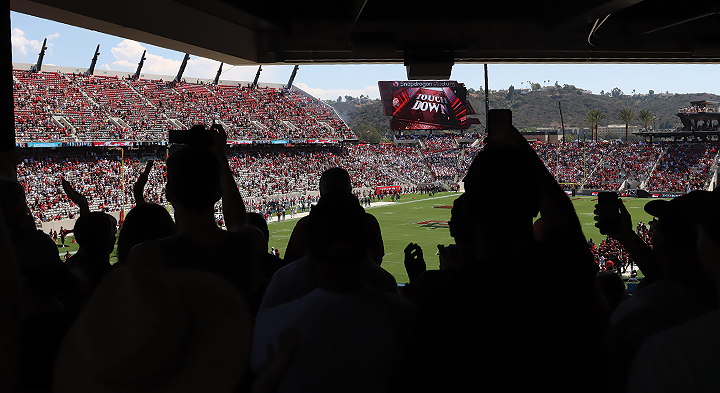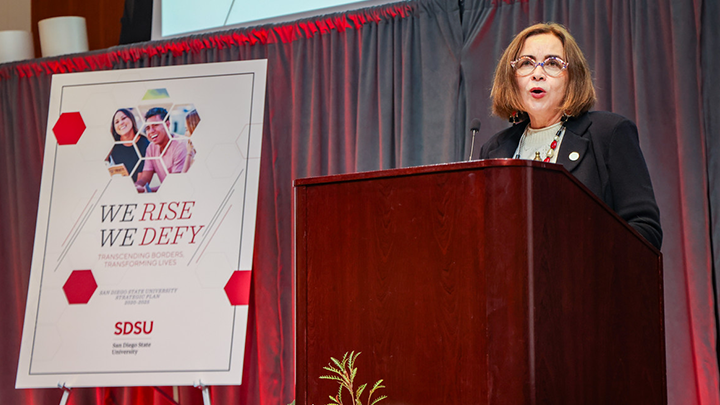Tuesday, February 27, 2024
Motivated by the strategic plan, students, staff, faculty and administrators have spent years dedicated to building a resilient and sustainable university through expanded efforts and new projects.
Since the launch of the We Rise We Defy: Transcending Borders, Transforming Lives strategic plan, the Office of Energy and Sustainability has been established, with full-time staff co-located with the College of Arts and Letters and the Center for Regional Sustainability in the Arts & Letters building.
“We recognized that, as citizens of a global society, we are collectively accountable for the responsible stewardship of the environment. We must do what we can to mitigate our impacts on the planet,” said Eric Hansen, associate vice president for Business Operations.
Newly created within the last four years through the strategic plan are the following, among many other efforts:
- Guiding Principles for Sustainability were developed and the Carbon Neutrality Feasibility Study was finalized.
- The SDSU Sustainability Hub was introduced in fall 2023 after the Office of Energy & Sustainability moved to the Arts and Letters building. The Sustainability Hub is a collaboration between the Office of Energy & Sustainability, the Center for Regional Sustainability, and the College of Arts & Letters to focus on the intersections of operations, education and community research projects that promote collaboration and support sustainable efforts.
- The President’s Sustainability Advisory Committee launched in 2022, which is a representative committee of faculty, staff, and students that has a mission to:
- Assess campus progress towards meeting SDSU’s sustainability goals and objectives by providing periodic reports to the President and campus leadership.
- Share information and identify opportunities that promote campuswide collaboration in achieving SDSU’s sustainability goals.
- Recommend and support policies and programs to promote campus environmental stewardship, social justice, and sustainability objectives.
Make sustainability a core value of all education, research, operational and student life programs.
- Co-host the annual SDSU Sustainability Summit with A.S. to showcase sustainability efforts across campus colleges and departments.
- Snapdragon Stadium and the Aztec Recreation Center join what is now a total of 15 buildings with Leadership in Energy and Environmental Design (LEED) certification. SDSU is the only California State University (CSU) campus with two LEED Double Platinum buildings.
- Snapdragon Stadium was designed for a 40% reduction in potable water usage and a 55% reduction in outdoor water usage compared to the LEED baseline, has LEED gold-recognized solar arrays installed on site, vegetation accounts for 25% of the outdoor space, and outdoor surfaces constructed with light-colored materials to reflect sunlight and mitigate the heat island effect. The stadium is part of a transit-oriented development that features best-in-class biking and pedestrian infrastructure. Other sustainable measures are also in place.
- In addition to other facilities, the Associated Students built and operates the Aztec Recreation Center, which saw an expansion and renovation completed in 2022. The building is LEED Platinum, fossil fuel-free, and powered by 250 kW of onsite solar energy. This year, another 750 kW will be completed.
- This January, SDSU Dining locations began introducing compostable to-go packaging in our venues, replacing single-use plastics. Also, UTK — along with the Garden Restaurant — utilizes reusable tableware and dishware for guests.
- The annual Sustainability Summit was launched, with plans to be an annual event. The next Sustainability Summit will be held on April 17, 8:30 a.m. to 4:30 p.m. in Montezuma Hall featuring presentations related to campus initiatives and projects. RSVP online.
- As a transit-oriented campus, Parking and Transportation Services has implemented discounted transit passes for students and pre-tax monthly passes for employees.
- As part of university efforts to drive sustainable modes of transportation, many students, faculty and staff rely on the trolley, buses, micromobility, walking and bicycles to get to, from and around campus.
- In 2023, SDSU began an ambitious Electric Vehicle (EV) charging expansion and the university has established a contract to install and manage electric vehicle (EV) chargers at all SDSU campus locations. By the end of 2024, the EV charging network will grow from 35 ports to over 70 ports. Three new EV Zipcars have been added to the car-sharing fleet as well.
- Compost collection has been initiated in many areas of campus with additional locations coming soon. Collection is underway in some office building kitchens, recreation areas, dining service areas such as east and west commons, student housing buildings and satellite campuses at Mission Valley and Imperial Valley.
“We are making major strides in sustainability. These are critical efforts as they build up our community and impact every single person at SDSU,” said Kristin Larson, director of the Office of Energy and Sustainability.
Students are a critical part of sustainability on campus, in addition to the sustainable buildings. Associated Students Green Love Commission hosts the Annual GreenFest, a weeklong series of educational events that promote sustainability. In the last four years, they have also diverted thousands of garments from the landfill through the A.S. Swap Shop and contributed key improvements to the SDSU Mission Valley Environmental Impact report.
This year’s GreenFest will be held March 11-15. In addition, a number of student clubs and organizations are also dedicated to sustainability, to include Greeks Gone Green, the Geography Club, Save Soil SDSU and the Alt Protein Project.
For these and other efforts, SDSU is recognized for its commitment to sustainability and efforts that are driving a more sustainable campus, to include being named to The Princeton Review’s Guide to Green Campuses.
Sam Lingao, the executive vice president for Associated Students, said: “We are grateful and proud to contribute to the impactful strategic plan initiatives that have expanded on Associated Students’ legacy of sustainability leadership.”





